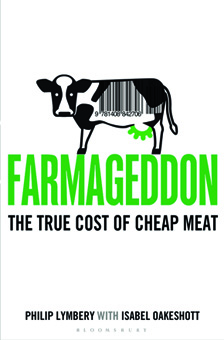A little bird…
by Philip Lymbery with Isabel OakeshottAt the height of his powers, Chairman Mao launched a war on sparrows. On a mission to turbocharge China’s productivity, the Communist leader decided that the birds were eating too much grain. One winter day in 1958, he mobilised the population of China to kill them off. The campaign was ruthlessly coordinated. At dawn on the specified day, young and old, in town and country, gathered to launch a simultaneous attack. Everyone had a role, from old folk who stood under trees waving flags and banging pots and pans, to schoolgirls issued with rifles and trained how to shoot, and teenage boys who climbed trees and tore down nests, smashing eggs and killing baby birds.
Against such an onslaught, the birds didn’t stand a chance. Across China, the sparrow population was decimated. Millions of birds lay dead. Too late, the regime realised that the sparrows were not pests, pilfering the harvest, but vital to the food chain. When they disappeared, the bugs they once fed on thrived. The locust population spiralled out of control, the grasshoppers too. The insects devoured the crops and famine followed. So Mao called off the campaign and sparrows were once again left in peace. But it took decades for the species to recover. Meanwhile the balance of nature was so out of kilter that there was talk of having to import sparrows from the Soviet Union.
Imagine if the British Prime Minister or the US President tried something similar today. We would think they were out of their minds. Yet the effect of agricultural policy in Europe and the Americas in the past few decades has been almost exactly the same as Mao’s purge. Tree sparrows – the same species Mao targeted – have declined in Britain by 97 per cent over the last forty years, largely due to the intensification of agriculture. The figures for other well-loved birds are no less alarming. Modern farming has become so ‘efficient’ that the countryside is now too sterile to support native species.
The collapse of native bird populations is just one of many disturbing consequences of an agricultural policy based on intensification. It’s a process that has been under way for decades, but where will it take us? The aim is to pound more flesh out of every farm animal, and extract ever higher yields from every acre of land. High-input intensive farming systems rely on mass production to give a return on investment.
The result has been the slow demise of the traditional mixed farm, on which animals and crops were rotated on grass and soil that largely replenished itself, and the ascendancy of farms that specialise in single crops sustained by fertilisers, or in livestock reared indoors.
Of course birds are not the only victims of this quiet revolution. The remorseless drive to get more for less is taking place at the expense of many other animals and insects; at great risk to public health; and often at a heavy cost to people thousands of miles away.
From the introduction to Farmegeddon, reproduced by kind permission of Bloomsbury. Read on:
Farmageddon is Philip Lymbery and Isabel Oakeshott’s jaw-dropping examination of the mega-farming revolution, which has drastically diminished natural landscapes, habitats and food quality in the US, and is now threatening countryside, farms, food supplies and animal and human populations worldwide. As the farming industry globalises, we are increasingly uncertain exactly what is entering the food chain, and we are reaching a tipping point as native species crash. In this wake-up call about our food production practices and eating habits, the authors investigate:
• The bizarre new industry of trucking bees across the US to pollinate the vast orchards of California, where a chemical assault has decimated wild insect populations
• How antibiotics routinely given to industrially farmed animals are giving rise to deadly antibiotic-resistant superbugs
• How vast quantities of soya and grain that could feed billions of people is instead grown for animal fodder
• Human sores in malnourished children resulting from air pollution caused by the fish processing industry
• Toxic fumes produced by burgeoning sea algae as a direct result of intensive pig farming
• Why the 2013 horse meat scandal will not be the last to blight UK and European industrial agriculture
• How the suicides of 200,000 farmers in India since 1997 have been caused by the ‘predatory commercialisation of the countryside’
At every turn, they uncover the unintended consequences of putting profit before feeding people, and ask the insistent question: can’t there be a better way?
Farmageddon is published by Bloomsbury in paperback and eBook. Read more.
Philip Lymbery is the CEO of leading international farm animal welfare organisation Compassion in World Farming and a prominent commentator on the effects of industrial farming. He is a lifelong wildlife enthusiast and lives in rural Hampshire with his wife and stepson.
philiplymbery.com
Follow Philip on Twitter: @philip_ciwf
Isabel Oakeshott was Political Editor at the Sunday Times from 2010 to early 2014. Based in the Houses of Parliament, where she is a member of the parliamentary lobby, Isabel is a regular commentator on BBC One’s Sunday Politics, Sky News and Radio 4’s Today programme, and was the ghost writer for Inside Out, a fly-on-the-wall account of Gordon Brown’s government.
Pledge your support for Compassion in World Farming’s Raw campaign to end factory farming


